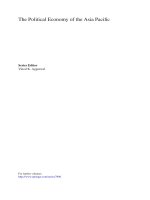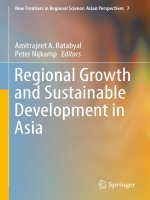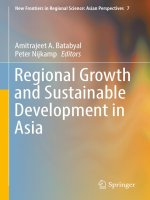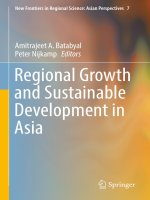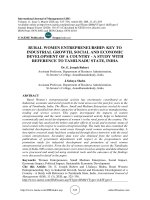Economic growth and economic development 537
Bạn đang xem bản rút gọn của tài liệu. Xem và tải ngay bản đầy đủ của tài liệu tại đây (122.93 KB, 1 trang )
Introduction to Modern Economic Growth
in the production process, making the production process itself more productive.
Alternatively, the knowledge stock of the economy could be a function of the cumulative output that the economy has produced up to now, thus giving it more of a
flavor of “learning-by-doing”.
In any case, substituting for (11.35) into (11.34) and using the fact that all firms
are functioning at the same capital-effective labor ratio, we obtain the production
function of the representative firm as
Y (t) = F (K (t) , BK (t) L) .
Using the fact that F (·, ·) is homogeneous of degree 1, we have
Y (t)
= F (1, BL)
K (t)
= f˜ (L) .
Output per capita can therefore be written as:
Y (t)
L
Y (t) K (t)
=
K (t) L
= k (t) f˜ (L) ,
y (t) ≡
where again k (t) ≡ K (t) /L is the capital-labor ratio in the economy.
As in the standard growth model, marginal products and factor prices can be
expressed in terms of the normalized production function, now f˜ (L). In particular,
we have
(11.36)
w (t) = K (t) f˜0 (L)
and
(11.37)
R (t) = R = f˜ (L) − Lf˜0 (L) ,
which is constant.
11.4.2. Equilibrium. An equilibrium is defined similarly to the neoclassical
growth model, as a path of consumption and capital stock for the economy, [C (t) , K (t)]∞
t=0
that maximize the utility of the representative household and wage and rental rates
523



